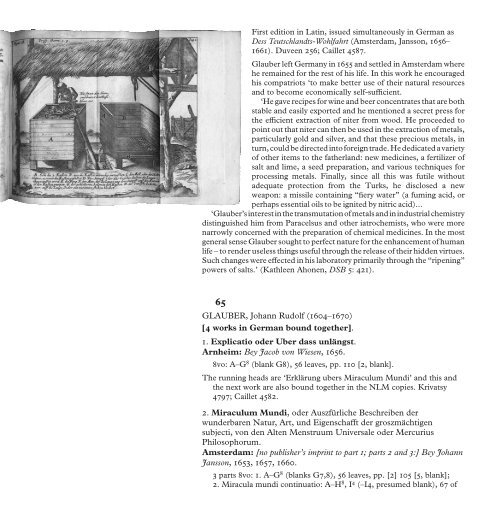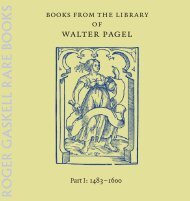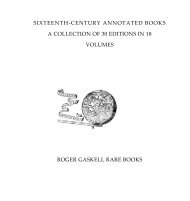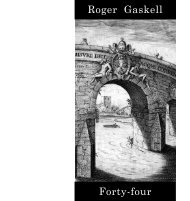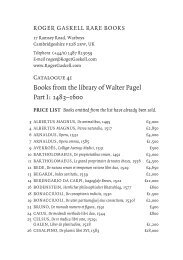pdf - Roger Gaskell Rare Books
pdf - Roger Gaskell Rare Books
pdf - Roger Gaskell Rare Books
You also want an ePaper? Increase the reach of your titles
YUMPU automatically turns print PDFs into web optimized ePapers that Google loves.
First edition in Latin, issued simultaneously in German as<br />
Dess Teutsch landts-Wohlfahrt (Amsterdam, Jansson, 1656–<br />
1661). Duveen 256; Caillet 4587.<br />
Glauber left Germany in 1655 and settled in Amsterdam where<br />
he remained for the rest of his life. In this work he encouraged<br />
his compatriots ‘to make better use of their natural resources<br />
and to become economically selfsuYcient.<br />
‘He gave recipes for wine and beer concentrates that are both<br />
stable and easily exported and he mentioned a secret press for<br />
the eYcient extraction of niter from wood. He proceeded to<br />
point out that niter can then be used in the extraction of metals,<br />
particularly gold and silver, and that these precious metals, in<br />
turn, could be directed into foreign trade. He dedicated a variety<br />
of other items to the fatherland: new medicines, a fertilizer of<br />
salt and lime, a seed preparation, and various techniques for<br />
processing metals. Finally, since all this was futile without<br />
adequate protection from the Turks, he disclosed a new<br />
weapon: a missile containing “Wery water” (a fuming acid, or<br />
perhaps essential oils to be ignited by nitric acid)...<br />
‘Glauber’s interest in the transmutation of metals and in industrial chemistry<br />
distinguished him from Paracelsus and other iatrochemists, who were more<br />
narrowly concerned with the preparation of chemical medicines. In the most<br />
general sense Glauber sought to perfect nature for the enhancement of human<br />
life – to render useless things useful through the release of their hidden virtues.<br />
Such changes were eVected in his laboratory primarily through the “ripening”<br />
powers of salts.’ (Kathleen Ahonen, DSB 5: 421).<br />
65<br />
GLAuBER, Johann Rudolf (1604–1670)<br />
[4 works in German bound together].<br />
1. Explicatio oder Uber dass unlängst.<br />
Arnheim: Bey Jacob von Wiesen, 1656.<br />
8vo: A–G8 (blank G8), 56 leaves, pp. 110 [2, blank].<br />
The running heads are ‘Erklärung ubers Miraculum Mundi’ and this and<br />
the next work are also bound together in the NLM copies. Krivatsy<br />
4797; Caillet 4582.<br />
2. Miraculum Mundi, oder Auszfürliche Beschreiben der<br />
wunderbaren Natur, Art, und EigenschaVt der groszmächtigen<br />
subjecti, von den Alten Menstruum universale oder Mercurius<br />
Philosophorum.<br />
Amsterdam: [no publisher’s imprint to part 1; parts 2 and 3:] Bey Johann<br />
Jansson, 1653, 1657, 1660.<br />
3 parts 8vo: 1. A–G8 (blanks G7,8), 56 leaves, pp. [2] 105 [5, blank];<br />
2. Miracula mundi continuatio: A–H8 , I4 (–I4, presumed blank), 67 of


